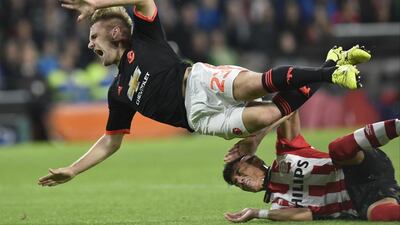It has been a bad week for football injuries. Boca Juniors midfielder Fernando Gago ruptured his Achilles tendon 30 seconds into a derby match against River Plate. He was replaced by my compatriot Nicolas Loderio, who then scored the only goal. Out of one man’s despair, another man’s joy.
Manchester United’s Luke Shaw and Barcelona’s Rafinha also picked up serious injuries in the Uefa Champions League. Both were horrible to see, especially to top, young players. I wish them well in their recovery. Luck plays a big part in injuries — bad luck.
It is a curse of our profession. You can be on top of the world playing well one minute but cut down in a second, like the three players this week. Sometimes it is the result of a horrible tackle, other times when no other player is near you. Many footballers have ruptured their cruciate ligaments merely by turning and twisting awkwardly. Thirty years ago, that would have finished your career. Now, you can rupture a cruciate and be back in eight or nine months like nothing has happened. But that is a best-case scenario.
In recovery, mental strength is as important as physical strength. You have to be calm, patient and work hard to get through the frustration of not being able to do what you love, but even then it is not always easy.
MISS ANY OF DIEGO’S PREVIOUS COLUMNS? FIND THEM ALL HERE
My grandfather, Juan Carlos Corazo, was a big player for Independiente and Uruguay. He also coached Uruguay in the 1962 World Cup. His career was ended by an injury and medical negligence. He went to have an operation on one knee. Instead, they operated on his other one. Can you believe it?
I understand why players stick with doctors who they trust. Thomas Vermaelen was injured at Barcelona last season — and yet another player who got injured again this week — but chose to see a specialist in Finland. Many players do this and it can be tough for clubs who have their own doctors, but there are plenty of examples of clubs rushing players back from injury because their doctor was under pressure from the manager. It can be best that the player’s doctor and club meet and work on a recovery schedule together, otherwise the player will get different instructions. Many injuries are complicated by what a player does in his recuperation.
A problem for Rafa Benitez during his time in charge at Inter Milan was his relationship with the club doctor. It led to him being sacked. The same problem has happened more recently between another former Inter manager, Jose Mourinho, and the doctor at his current club Chelsea, Eva Carneiro. They have slightly different priorities: his is to win matches, hers is the well-being of the players.
With Benitez at Inter, he wanted players rushed back from injuries and the doctor did not agree. A manager will be under pressure himself and needs his best players back. Some will be patient and wait, knowing that the player needs to be 100 per cent ready to return to the first team. It is an issue at the heart of football because it is not a simple subject but one where assessments are subjective.
Some players will come back sooner than they should, maybe because their contract is running out and they want a new one. People expressing sympathy for their plight does not pay their bills or mean they will be offered a new contract, so sometimes they take a risk and push themselves back into action before they should. Other players will sign a contract with conditions which account for the fact that they may have been injury prone in the past.
Healthy players try not to think too much about injuries. They do not hold back in matches, they know it is a risk of their profession — one which has a short lifespan — and they hope to avoid any long-term injuries.
It could be worse, the average career span for an NFL American football player is only 3.3 years.
***************************************
Uruguay’s rugby union team, “Los Teros” — named after a bird you find on farms in Uruguay — have done really well to reach the Rugby World Cup in England and Wales, which starts Friday.
Rugby is an upper-class sport in my country. Not many people play it compared to football, but I see a lot of the players, as we train at the same place. I can’t wait to see them play against Wales at the Millennium Stadium in front of 75,000 people, and at Manchester City’s Etihad Stadium against England. They also play Australia and Fiji in Pool A. It will be very tough.
Wales is one of the few countries as small as Uruguay; we both have three million people. But rugby is a sport of the masses there, not like in Uruguay.
I know Los Teros will be underdogs and the fans will be outnumbered in Wales with all those people singing their national anthem, but that is nothing new to us.
And we can sing, too, just watch the pride and emotion in the players when they sing our national anthem on Sunday. We are all behind you!
FOLLOW US ON TWITTER @NatSportUAE

